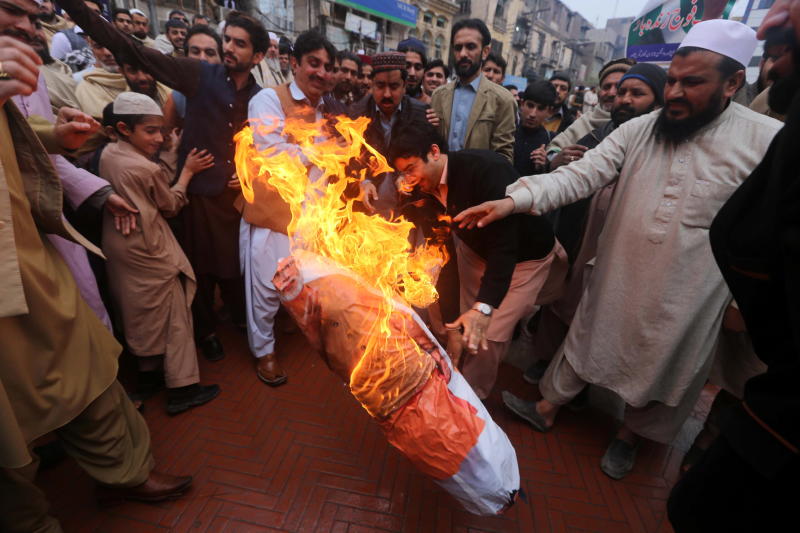India-Pakistan tensions spill over to meeting of the Organisation of Islamic Cooperation
Sign up now: Get insights on Asia's fast-moving developments

Protesters burn an effigy of Indian Prime Minister Narendra Modi in Peshawar, Pakistan, on March 1, 2019.
PHOTO: EPA-EFE
NEW DELHI - India-Pakistan tensions rippled into the Organisation of Islamic Cooperation (OIC) after Pakistan decided to boycott a meeting of its foreign ministers in Abu Dhabi on Friday (March 1).
Its foreign minister Shah Mahmood Qureshi chose to stay away because of the presence of his Indian counterpart Sushma Swaraj. India was invited as a "guest of honour" to the meeting by the United Arab Emirates (UAE).
Pakistani newspaper Dawn said Mr Qureshi told his country's lawmakers on Friday that he had asked the UAE to "review" the decision but he was told "it would be hard to retract the invitation".
India, meanwhile, took the spotlight at the OIC and used the platform to launch a veiled attack on Pakistan.
"If we want to save humanity, we must tell the states who provide shelter and funding to terrorists to dismantle the infrastructure of the terrorist camps and stop providing funding and shelter to the terror organisations based in that country," Ms Swaraj said at the plenary session of the meeting.
Formed 50 years ago, the Jeddah-based OIC groups 57 member states and describes itself as the "collective voice of the Muslim world". India, which has the world's second largest Muslim population - after Indonesia - has been excluded from the OIC since its formation in 1969. Friday was the first time India had been represented officially at the body.
It is a remarkable turnaround for the OIC, which had invited India to be part of the inaugural conference in 1969 in Rabat, in Morocco, but subsequently did not allow any official delegation from New Delhi to participate in the meeting. This was because Pakistan, along with some its supporters, threatened to pull out of the opening summit if India was allowed to participate.
Since then, the OIC has been used by Pakistan to criticise India, particularly its role in Jammu and Kashmir. India has argued that the body has "no locus standi" to comment on India's internal affairs. On Friday though, New Delhi had some kind words when Ms Swaraj said the OIC "has a key role in shaping our world" and offered to share India's "market, resources, opportunities, and skills".
UAE's decision not to rescind its invitation has been widely seen as a diplomatic triumph for India, whose clout has grown manifold since 1969. India has developed wide-ranging strategic ties with many OIC member countries, including the UAE and Saudi Arabia in recent years, moving beyond conventional areas of cooperation like energy and people-to-people links to defence and security.
Mr Talmiz Ahmad, a retired diplomat who served as India's ambassador to Saudi Arabia as well as the UAE, says the latest development indicates that the "balance of influence has now shifted away from Pakistan in favour of India".
"There is now a fundamental shift in perceptions relating to India from the Islamic world mainly because India is a significant political and economic role player in regional and world affairs," he told The Straits Times.
While some have advised caution as a secular India engages with a body formed on the basis of religion, Mr Ahmad has argued that India is well poised to have a substantial engagement with the OIC.
Besides focusing on "partnership in areas that resonate in contemporary ties", he says, "what we need to do is ensure that our young people across the Muslim world have a vision of hope and achievement and that they are led to feel there is a future for them so that they are able to avoid the blandishments of extremism".


